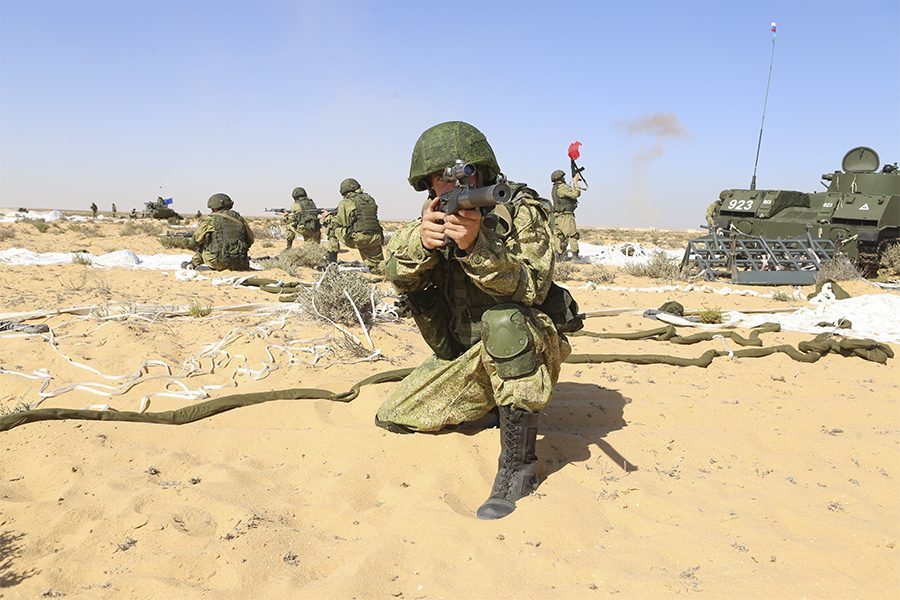 Photo Credit: eng.mil.ru
Photo Credit: eng.mil.ru
Putin’s Next Adventure?
On March 14th, Russia reportedly deployed special forces to an airbase in western Egypt near the Libyan border. This follows months of a Russian presence in Libya through the use of Russian military contractors and meetings with Libyan rogue general and political player, General Khalifa Haftar, the most recent of which occurred in January. Since the Arab Spring and the end of Qaddafi’s rule, Libya has failed to establish a government with complete control over the country’s territory. The country has become a patchwork of rival governments, militias, and terrorist groups in constant competition with one another for international recognition, political support, and Libya’s rich energy supplies. With these issues in mind, Russia has economic, diplomatic, and political incentives to increase its involvement in Libyan politics and establish itself as a power broker.
First and foremost, the deployment of Russian special forces coincides with an ongoing battle between Haftar’s forces (the Libyan National Army) and the jihadist-linked Bhengazi Defense Brigades over the Ras Lanuf and Es Sider oil ports. Libyan oil production capacity is substantial; prior to the Arab Spring, it produced 1.1 million barrels per day. Haftar loosely controlled much of the Libyan “Oil Crescent” (to include Ras Lanuf and Es Sider) from September 2016 up until the recent bout of fighting. While under Haftar’s control, Libyan oil production jumped from roughly 250,000 bpd to 700,000 bpd. Providing support to Haftar could pave the way to future stakes in Libyan oil production for Russian energy companies, which provided 37% of the Russian government’s budget in 2016.
Libya is also a source of refugees to Europe and a potential haven for jihadists. Both of these factors have made establishing a credible Libyan government a Western priority, but the presence of multiple powerful factions, particularly Haftar’s Libyan National Army, has made it difficult for a government to form. The EU, US, and UN are currently backing the Government of National Accord (GNA) based out of Tobruk. Haftar, arguably the militarily strongest figure in the country, does not back the GNA, which has led to the EU approaching Russia for assistance in establishing cooperation between Haftar and the GNA. Without Haftar’s military support, the GNA will not be able to establish territorial control throughout Libya; by establishing itself as Haftar’s patron, Russia gains diplomatic leverage against the EU that could be used to extract concessions on other issues.
The deployment of forces to Libya also opens up the possibility of another military intervention to boost domestic popularity. The popularity of United Russia, Putin’s party in the Russian Duma, has been falling since 2016 and Russian voter turnout during the 2016 parliamentary elections was at an all-time low. Frustration continues to grow and has turned into ongoing mass protests against Prime Minister Dmitry Medvedev and corrupt officials across the country. Putin is the only part of the Russian government that has consistently maintained his popularity.
The next presidential election will be in 2018 and, while Putin will almost assuredly win through a mixture of opposition intimidation, incumbent advantage, and his own cult of personality, he must win a strong, popular mandate to ensure his continued rule. In fact, the Russian government is already attempting to use a potential diplomatic success in Libya as propaganda. At the same time, nationalist forces in Russia have grown increasingly prevalent, potentially destabilizing, and more vocal about the need for greater shows of Russian force. A Syria-style, overt intervention into Libya under the auspices of battling jihadism or chasing down Islamic State remnants could provide a temporary bump in popularity ahead of the election.
Given these conditions, the US’s best available course of action is to continue to support the GNA and attempts to secure a deal between Haftar and the GNA that can produce a stable government in Libya. At the same time, Libya is an area of potential US-Russo cooperation and the US should not be afraid to coordinate with Russia in efforts to bring Haftar to the negotiating table so long as that cooperation does not require the weakening of a potential political deal. Russia may be open to such cooperation because it would provide potent propaganda material while still allowing Russian influence in the country. Assuming that any such deal produces a sustainable Libyan government, it would also advance the American interest of increasing stability in Libya without sacrificing American influence. Russian cooperation or not, the US should actively counter any attempts to undercut the GNA or weaken its position.





